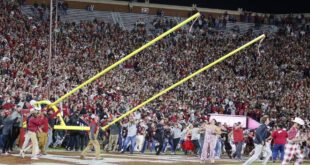LOS ANGELES — The baseball disappeared into the jet-black sky, only resurfacing as the lights of Dodger Stadium illuminated its descent. There have been days this month when Freddie Freeman looked like he could barely walk. After his final swing in a 6-3 victory over the New York Yankees in Game 1 of the World Series, he only had to trot. Freeman, the hobbled first baseman for the Los Angeles Dodgers, found a way to match Kirk Gibson in more than his gait. He swatted a 10th-inning walk-off grand slam on Friday night, a slight improvement on Gibson’s legendary walk-off in Game 1 of the 1988 World Series.
It was a preposterous ending to a game filled with stars and streaked with tension. After the Yankees scratched together a run in the top of the 10th, the Dodgers staged an epic comeback. With two outs, Yankees manager Aaron Boone opted to walk the bases loaded and permit left-handed pitcher Nestor Cortes to face Freeman. Cortes fired a first-pitch fastball. Freeman swung his way into baseball history.
After spraining his ankle in late September, Freeman has spent this October playing through agony. He sat out the pennant-clinching victory over the New York Mets last week. He hoped the four-day layoff before Game 1 of the Fall Classic would help his recovery. He cannot be displeased with the result.
It was a raucous ending for the fans at Dodger Stadium. It was also a possible harbinger of how much drama awaits in this series.
FREDDIE FREEMAN WALK-OFF GRAND SLAM. #WORLDSERIES pic.twitter.com/5MIY5CaX6a
— Los Angeles Dodgers (@Dodgers) October 26, 2024
Before the late-night resolution, Yankees starter Gerrit Cole limited the Dodgers to four hits in six innings. Dodgers starter Jack Flaherty kept the Yankees off the board until Giancarlo Stanton hit a monstrous, two-run homer in the sixth. The game approached classic territory when Shohei Ohtani smashed a double in the eighth and scored on a sacrifice fly by Mookie Betts. Nine innings was not enough to decide Game 1.
For the 12th time, the Dodgers and the Yankees met on this stage. As it did in all those meetings from the 1940s to the 1980s, the Series pitted some of the sport’s biggest stars. Ohtani and Betts for Los Angeles. Aaron Judge and Juan Soto for New York. Goliath versus Goliath. Two of the most patient, taxing, destructive lineups in the sport, facing a pair of pitching staffs run ragged along the long road to the Fall Classic. The baseball was expected to fly.
The first meeting did not exactly match expectations. But it did not disappoint.
The pregame festivities stirred up echoes. The Dodgers staged a series of tributes to Fernando Valenzuela, the Mexican southpaw who captivated the baseball world upon his debut as a starter in 1981 and forged an indelible connection between the team and the city’s Latino community. Valenzuela died earlier this week. Fans festooned jerseys, flowers and sombreros to the ballpark signage along Vin Scully Avenue in memory of “El Toro.” His No. 34 was painted on the slope behind the pitcher’s mound.
The season of “Fernandomania” coincided with the last time the Dodgers and Yankees met in the World Series. This matchup marked a rematch 43 years in the making. Flaherty, a Los Angeles native, wore a Valenzuela jersey on his way to the stadium. He could only hope to replicate Valenzuela’s complete-game victory in Game 3 back in 1981. His counterpart, Cole, grew up in nearby Orange County, cheering for the Yankees on the other side of the country. He eventually joined them, after the 2019 season, on a $324 million contract that set a record for free-agent outlay for a pitcher.
The two pitchers traded zeroes through the first four innings. Flaherty extricated himself from a first-inning jam after a walk by Soto and an error by NLCS MVP Tommy Edman. Cole stranded first baseman Freddie Freeman after an unlikely two-out triple. Sickly and ineffective during a Game 5 pounding by the Mets last week, Flaherty fired mid-90s fastballs to subdue the Yankees. Prone to hits and unable to finish at-bats in his last outing against Cleveland, Cole struck out three batters through three innings. He finished the third by fanning Ohtani with a curveball at the shins.
Cole bullied the Dodgers with his fastball. He flooded the strike zone with the pitch but mostly generated soft contact. In the fourth inning, he shattered Freeman’s bat twice, first with a cutter and then with a 98.4 mph heater. Flaherty provided a rejoinder in the fifth. He used his curveball to strike out Yankees shortstop Anthony Volpe and catcher Austin Wells. After a two-out single by outfielder Alex Verdugo, Dodgers third baseman Max Muncy corralled an awkwardly placed grounder from Yankees second baseman Gleyber Torres to end the inning.
The heater got Cole into trouble in the bottom of the fifth. He challenged center fielder Kiké Hernández with a 97-mph four-seamer. Hernández stung the pitch down the right-field line, where Soto’s lunge came up empty. Hernández scampered to third with only the second hit of the evening for Los Angeles. He scored on a sacrifice fly to right from catcher Will Smith. Hernández swam across the plate just ahead of a throw from Soto.
The sixth inning sent Flaherty into the deep water: A third time facing the trio of Soto, Judge and Stanton. Dodgers manager Dave Roberts felt uncomfortable about exposing his best relievers too often against the best hitters of the Yankees. So it was up to Flaherty.
Soto sparked the scoring. He smacked a slider into center for a leadoff single. After Flaherty struck out Judge for the third time, he took on Stanton. Stanton can lull pitchers into a false sense of comfort. He comes by this the hard way: He swings and misses often. Flaherty started the at-bat with a slider near the dirt and a curveball well below the zone. Stanton whiffed on both. He did not whiff on the fourth pitch, a curveball that dipped low enough to likely be called a ball but high enough to merit a reaction from Stanton.
Stanton sent the baseball soaring toward the left-field fence. The exit velocity was measured at 116.6 mph, a seismic blast that put the Yankees ahead. He carried his bat a few steps down the line before flinging it toward his dugout. The lumber landed on the World Series logo.
GIANCARLO STANTON
DOES IT AGAIN
FOUR STRAIGHT GAMESARE YOU KIDDING?! pic.twitter.com/sSVXe5QMW3
— MLB (@MLB) October 26, 2024
The Dodgers applied pressure in response, but did not even the score until the eighth. A leadoff double in the sixth went nowhere. Putting the first two batters aboard in the seventh netted nothing.
In the eighth, though, Yankees manager Aaron Boone permitted right-handed reliever Tommy Kahnle to face Ohtani. Kahnle almost exclusively throws changeups, a pitch designed to quiet left-handed hitters. Ohtani, of course, is not like almost all other left-handed hitters. He walloped a changeup off the right-field fence and took third on an errant pick attempt by second baseman Gleyber Torres. Betts tied the game with a sacrifice fly.
The top of the ninth proved harrowing for the Dodgers. Torres launched a 99.2 mph fastball from reliever Michael Kopech toward the center-field fence. A fan clad in Dodger blue reached over and grabbed the baseball, pulling it over the fence. The umpires signaled interference as the fan packed his gear to exit the premises. Torres settled at second base. Roberts opted to intentionally walk Soto and let new reliever Blake Treinen face Judge, the presumptive American League MVP. Treinen made quick work of his decorated opponent, getting Judge to hit a harmless popup above the infield.
(Photo of Freddie Freeman after his game-winning homer: Harry How / Getty Images)
 meganwoolsey Home
meganwoolsey Home



